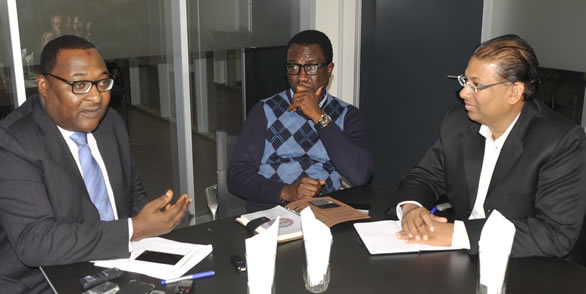APM Terminals Apapa Limited has said that it will soon commence evacuation of cargoes from Nigeria’s premiere port to Kano by rail as part of efforts aimed at facilitating cargo clearance. Chief Financial Officer of APM Terminals Apapa, Sunil Bansal stated this yesterday when the Executive Secretary/CEO of Nigerian Shippers’ Council (NSC), Hassan Bello visited the facility. Bansal said APM Terminals remains the only terminal in Lagos connected to the rail line through to the hinterlands noting that when the rail tracks which will move cargoes from Lagos to Kano become fully operational, importers whose cargoes are destined for the hinterlands will no longer have to come to Lagos to clear their consignments. “We are very much ahead in the process of connecting Kano which is another business hub to Lagos by train. We expect to start operation very soon. We are having some little challenges but we are almost set to start. This is the only terminal in Lagos which is connected to rail through to the hinterland. “We have two lanes inside and two trains can come simultaneously and with this. People do not have to come to Lagos to clear their cargo, it can be cleared at their doorstep. Those are the kind of investment and processing that we are coming with,” Mr. Bansal stated. The APM Terminals Apapa CFO said the company has so far invested USD350 million (about N70 billion) in modernizing and upgrading the Apapa terminal. “When we started the terminal nine years back, the dream was to make this terminal a world class facility and we are happy to say this terminal is equivalent to any other terminal in Europe in terms of infrastructure and processes,” he said. Speaking earlier, the NSC chief executive lauded APM Terminals’ commitment to the development of the port especially in the areas of infrastructural development and acquisition of modern cargo handling equipment which he said has brought about efficiency and increased tonnage at the port. “I am happy to know that there is an effort with what you are doing with the inland terminals. We are appreciative of the continued investment you have made in the operations of your terminal. “When the port was concessioned to the private sector, it shows that the private sector is the engine room of development. We have also seen growth of increase in the tonnage which shows there is some efficiency,” Bello said. Bello said for terminals to achieve a sustainable increase in productivity, there is need for collaboration with relevant government agencies. “In port operations, we all need to come together, nobody can be sufficient to solve the problems,” he said.
Copyright Ships & Ports Ltd. Permission to use quotations from this article is granted subject to appropriate credit given to www.shipsandports.com.ng as the source.

